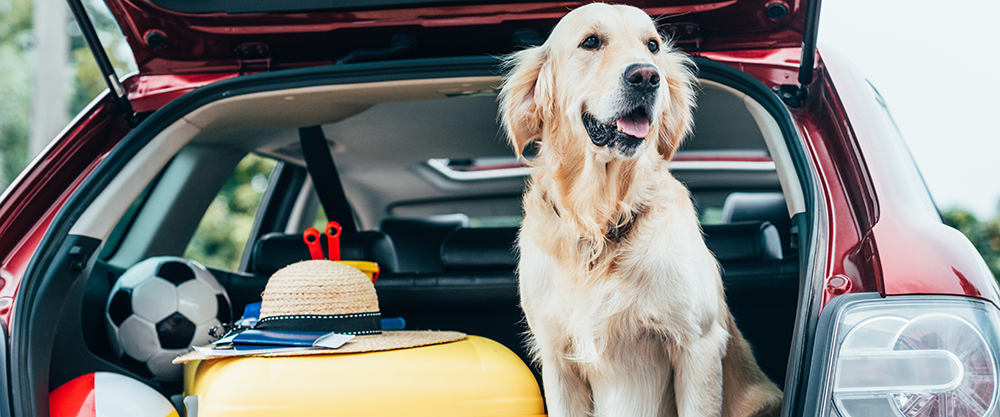Noise Anxiety and Your Dog: Handling Fireworks and Thunderstorms
Many dogs suffer from noise anxiety, which is the extreme fear of unexpected loud noises. For some animals, noise anxiety can be crippling. Loud noises can cause stress and inflammation which in turn can trigger bad behavior and health problems too. Here, methods for minimizing noise anxiety due to thunderstorms and fireworks will be discussed.
Symptoms of Noise Anxiety in Dogs
The most common triggers of noise anxiety (also called noise phobia) are thunderstorms and fireworks. Other triggers include gunshots, construction zones, and even the vacuum cleaner. Dogs have more sensitive hearing than humans, and can also sense associated changes in barometric pressure, scent, and electrostatic charges that humans cannot detect as easily. Signs your dog has noise anxiety include:
- Urinating
- Defecating
- Panting
- Pacing
- Chewing
- Escape Attempts
- Excessive Digging
- Excessive Barking
- Trembling
- Dilated Pupils
- Comfort-Seeking Behaviors
- Hiding
Many of these symptoms, such as escape attempts, can be so frenzied that the dog is a hazard to itself and others.
Managing Noise Anxiety in Dogs
Managing noise anxiety in dogs is important for the health and safety of your pet. Anxiety floods your dog’s body with cortisol, which triggers the “fight or flight” response. A side effect of cortisol is inflammation, which can linger for up to 72 hours. When dogs are continually exposed to stressful events, inflammation builds up and can cause chronic medical problems. Examples include gastrointestinal distress, allergies, and even cancer. The following are ways to manage your dog’s noise anxiety:
Create a Calm Environment
When you know loud noises are imminent, such as on the 4th of July, create a calm and safe environment for your dog. Place your pet in a quiet, dark room. If possible, play soothing music at a volume that will help to drown out the noise. For dogs that are crate-trained, the crate is a comfortable space that also feels safe to dogs. If your pet is not crate-trained, remove anything from the room that could easily be destroyed or pose a risk to your pet.
Hire a Dog Sitter
If you plan to be away from home but know of an impending thunderstorm or fireworks display, hire a dog sitter. The dog sitter will keep your pet calm, safe, and distracted from the noise.
Exercise before Storms and Fireworks
 Another strategy is to vigorously exercise your dog before a storm or fireworks display. When your dog is tired he or she will be more likely to sleep through the loud noises.
Another strategy is to vigorously exercise your dog before a storm or fireworks display. When your dog is tired he or she will be more likely to sleep through the loud noises.
Counter-Condition Your Pet
You can teach your dog to make positive associations with loud noises through patience and vigilance. Every time your dog hears a loud noise, give your pet a high-value reward such as cheese or it’s favorite treat. Give your dog plenty of positive reinforcement as well. Dogs with mild to moderate noise anxiety can learn to associate scary sounds with positive outcomes.
Learn Pressure Wrapping Techniques
There are numerous pressure wrapping products on the market that can be used to reduce your dog’s anxiety. While the science behind pressure wrapping is not well known, this technique applies gentle pressure around the dog’s torso to create a calming sensation. This same principle is used for infants and children with autism.
Provide Calming Supplements
 Just as a cup of chamomile tea can provide instant relief to anxious humans, there are supplements on the market that have the same effect on dogs. For instance, WINPRO Focus is specially formulated to provide mental calmness while fighting the effects of inflammation caused by anxiety. Calming supplements can be used in conjunction with the methods mentioned here or alone.
Just as a cup of chamomile tea can provide instant relief to anxious humans, there are supplements on the market that have the same effect on dogs. For instance, WINPRO Focus is specially formulated to provide mental calmness while fighting the effects of inflammation caused by anxiety. Calming supplements can be used in conjunction with the methods mentioned here or alone.
Ask Your Vet About Medications
Finally, if your dog’s noise anxiety is severe and cannot be managed with any of the techniques listed here, talk to your veterinarian. Certain medications can be prescribed to keep your dog from injuring itself or others due to extreme noise anxiety.



